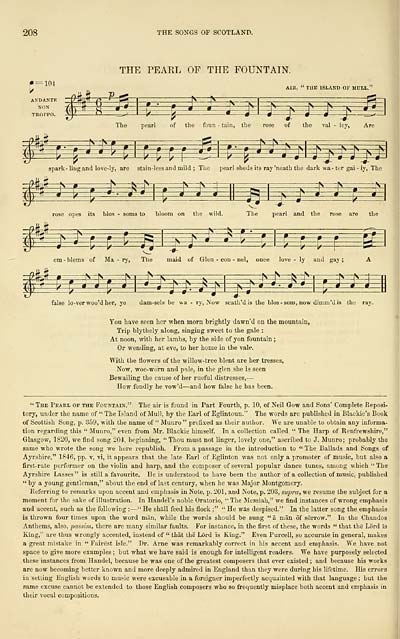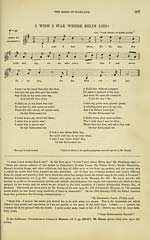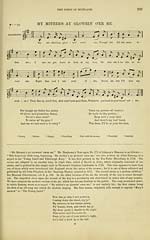Glen Collection of printed music > Printed music > Wood's edition of the songs of Scotland
(234) Page 208 - Pearl of the fountain
Download files
Complete book:
Individual page:
Thumbnail gallery: Grid view | List view

208
THE SONGS OF SCOTLAND.
THE PEARL OF THE FOUNTAIN.
104
iiMMt
AIR, " THE ISLAND OF MULL."
¥e
S^ESEEEf
EEEE
The
9 " -•*--- -#••
pearl of the foun - tain, the rose of ihe val - ley, Are
y .. . m s
fc
fs=f=
^3E^m^^3m=^^
£l^S
4zz4z
-/^
spark- ling and love-ly, are stain-
dtt it h N n. S.
ess and mild ; The pearl sheds its ray 'neath the darl,
wa- ter gai - ly, The
■ l/BiLff > » [> R p
IS \ !
>
> R
Vt "it I r # « J* m
■ J J J
*■
\
p J
(i\\ tt * L> r * • 4 •
d d d
"S
\ *
4
r «
vp ' u
/
~\
' m
»J "
4
-m- *
rose opes its bios - soms to bloom on the wild.
The pearl and the rose are the
^-=fc=*
^
E^f^B
tt
em - blems of Ma - ry, The maid of Glen - con - nel, once love - ly and gay ;
fe^^ii^
I S ^ fr-£
£=*:
pJ — »^-4~»
2*
4 4 4
false lo-verwoo'd her, ye dam-sels be wa - ry, Now scath'd is the bios- som, now dimm'd is the ray.
You have seen her when morn brightly dawn'd on the mountain,
Trip blythely along, singing sweet to the gale :
At noon, with her lambs, by the side of yon fountain ;
Or wending, at eve, to her home in the vale.
With the flowers of the willow-tree blent are her tresses,
Now, woe-worn and pile, in the glen she is seen
Bewailing the cause of her rueful distresses, —
How fondly he vow'd — and how false he has been.
" The Pearl of the Fountain." The air is found in Part Fourth, p. 10, of Neil Qow and Sons* Complete Reposi-
tory, under the name of " The Island of Mull, by the Earl of Eglintoun." The words are published in Blackie's Book
of Scottish Song, p. 359, with the name of " Munro " prefixed as their author. We are unable to obtain any informa-
tion regarding this " Munro," even from Mr. Blackie himself. In a collection called " The Harp of Renfrewshire,"
Glasgow, 1820, we find song 204, beginning, " Thou must not linger, lovely one," ascribed to J. Munro; probably the
same who wrote the song we here republish. From a passage in the introduction to " The Ballads and Songs of
Ayrshire," 1846, pp. v, vi, it appears that the late Earl of Eglinton was not only a promoter of music, but also a
first-rate performer on the violin and harp, and the composer of several popular dance tunes, among which " The
Ayrshire Lasses" is still a favourite. He is understood to have been the author of a collection of music, published
" by a young gentleman," about the end of last century, when he was Major Montgomery.
Referring to remarks upon accent and emphasis in Note, p. 201, and Note, p. 203, supra, we resume the subject for a
moment for the sake of illustration. In Handel's noble Oratorio, " The Messiah," we find instances of wrong emphasis
and accent, such as the following : — " He shall feed his flock ;" " He was despised." In the latter song the emphasis
is thrown four times upon the word man, while the words should be sung " a man of sorrow." In the Chandos
Anthems, also, passim, there are many similar faults. For instance, in the first of these, the words " that the Lord is
King," are thus wrongly accented, instead of " that the Lord is King." Even Purcell, so accurate in general, makes
a great mistake in " Fairest isle." Dr. Arne was remarkably correct in his accent and emphasis. We have not
space to give more examples ; but what we have said is enough for intelligent readers. We have purposely selected
these instances from Handel, because he was one of the greatest composers that ever existed ; and because his works
are now becoming better known and more deeply admired in England than they were during his lifetime. His errors
in setting English words to music were excusable in a foreigner imperfectly acquainted with that language ; but the
same excuse cannot be extended to those English composers who so frequently misplace both accent and emphasis in
their vocal compositions.
THE SONGS OF SCOTLAND.
THE PEARL OF THE FOUNTAIN.
104
iiMMt
AIR, " THE ISLAND OF MULL."
¥e
S^ESEEEf
EEEE
The
9 " -•*--- -#••
pearl of the foun - tain, the rose of ihe val - ley, Are
y .. . m s
fc
fs=f=
^3E^m^^3m=^^
£l^S
4zz4z
-/^
spark- ling and love-ly, are stain-
dtt it h N n. S.
ess and mild ; The pearl sheds its ray 'neath the darl,
wa- ter gai - ly, The
■ l/BiLff > » [> R p
IS \ !
>
> R
Vt "it I r # « J* m
■ J J J
*■
\
p J
(i\\ tt * L> r * • 4 •
d d d
"S
\ *
4
r «
vp ' u
/
~\
' m
»J "
4
-m- *
rose opes its bios - soms to bloom on the wild.
The pearl and the rose are the
^-=fc=*
^
E^f^B
tt
em - blems of Ma - ry, The maid of Glen - con - nel, once love - ly and gay ;
fe^^ii^
I S ^ fr-£
£=*:
pJ — »^-4~»
2*
4 4 4
false lo-verwoo'd her, ye dam-sels be wa - ry, Now scath'd is the bios- som, now dimm'd is the ray.
You have seen her when morn brightly dawn'd on the mountain,
Trip blythely along, singing sweet to the gale :
At noon, with her lambs, by the side of yon fountain ;
Or wending, at eve, to her home in the vale.
With the flowers of the willow-tree blent are her tresses,
Now, woe-worn and pile, in the glen she is seen
Bewailing the cause of her rueful distresses, —
How fondly he vow'd — and how false he has been.
" The Pearl of the Fountain." The air is found in Part Fourth, p. 10, of Neil Qow and Sons* Complete Reposi-
tory, under the name of " The Island of Mull, by the Earl of Eglintoun." The words are published in Blackie's Book
of Scottish Song, p. 359, with the name of " Munro " prefixed as their author. We are unable to obtain any informa-
tion regarding this " Munro," even from Mr. Blackie himself. In a collection called " The Harp of Renfrewshire,"
Glasgow, 1820, we find song 204, beginning, " Thou must not linger, lovely one," ascribed to J. Munro; probably the
same who wrote the song we here republish. From a passage in the introduction to " The Ballads and Songs of
Ayrshire," 1846, pp. v, vi, it appears that the late Earl of Eglinton was not only a promoter of music, but also a
first-rate performer on the violin and harp, and the composer of several popular dance tunes, among which " The
Ayrshire Lasses" is still a favourite. He is understood to have been the author of a collection of music, published
" by a young gentleman," about the end of last century, when he was Major Montgomery.
Referring to remarks upon accent and emphasis in Note, p. 201, and Note, p. 203, supra, we resume the subject for a
moment for the sake of illustration. In Handel's noble Oratorio, " The Messiah," we find instances of wrong emphasis
and accent, such as the following : — " He shall feed his flock ;" " He was despised." In the latter song the emphasis
is thrown four times upon the word man, while the words should be sung " a man of sorrow." In the Chandos
Anthems, also, passim, there are many similar faults. For instance, in the first of these, the words " that the Lord is
King," are thus wrongly accented, instead of " that the Lord is King." Even Purcell, so accurate in general, makes
a great mistake in " Fairest isle." Dr. Arne was remarkably correct in his accent and emphasis. We have not
space to give more examples ; but what we have said is enough for intelligent readers. We have purposely selected
these instances from Handel, because he was one of the greatest composers that ever existed ; and because his works
are now becoming better known and more deeply admired in England than they were during his lifetime. His errors
in setting English words to music were excusable in a foreigner imperfectly acquainted with that language ; but the
same excuse cannot be extended to those English composers who so frequently misplace both accent and emphasis in
their vocal compositions.
Set display mode to: Large image | Transcription
Images and transcriptions on this page, including medium image downloads, may be used under the Creative Commons Attribution 4.0 International Licence unless otherwise stated. ![]()
| Special collections of printed music > Glen Collection of printed music > Printed music > Wood's edition of the songs of Scotland > (234) Page 208 - Pearl of the fountain |
|---|
| Permanent URL | https://digital.nls.uk/91340551 |
|---|
| Description | Scottish songs and music of the 18th and early 19th centuries, including music for the Highland bagpipe. These are selected items from the collection of John Glen (1833 to 1904). Also includes a few manuscripts, some treatises, and other books on the subject. |
|---|
| Description | The Glen Collection and the Inglis Collection represent mainly 18th and 19th century Scottish music, including Scottish songs. The collections of Berlioz and Verdi collected by bibliographer Cecil Hopkinson contain contemporary and later editions of the works of the two composers Berlioz and Verdi. |
|---|

